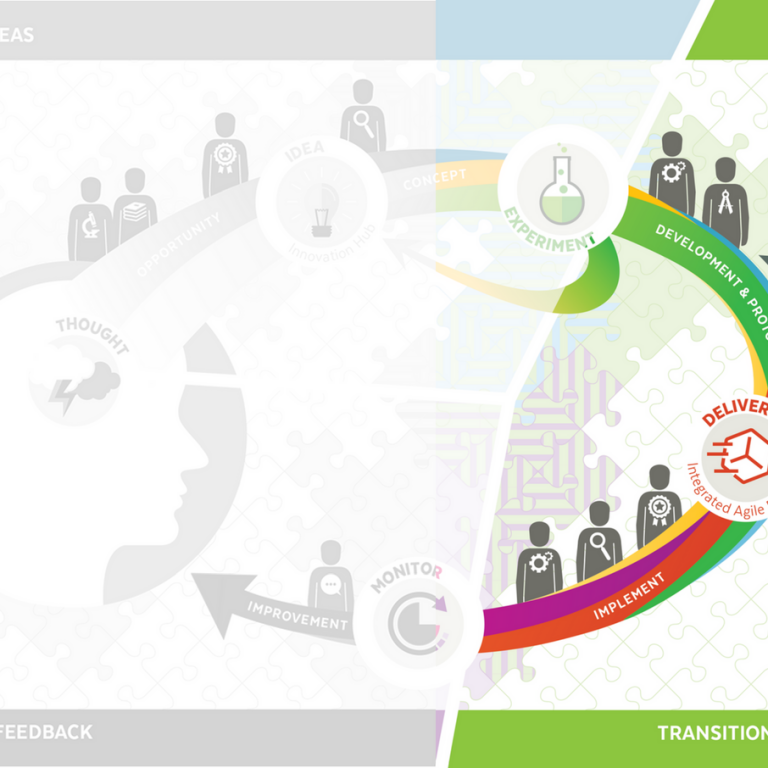
Transition to Reality is about transforming the innovation idea from the Incubate Ideas phase into reality.
The value-chain in this phase simultaneously facilitates continuous viable products to the customers and provides input for continuous transformation into the next phases.
Redefine the Project Management Office
Running project management to deliver improvement is one thing. Leveraging it to facilitate the innovation is the next. By using agile, ideation and continuous change as key differentiators, organisations are able to leverage project management to facilitate innovation.
MBT proposes the mechanism of integrating multi-layered capabilities with traditional project management to deliver the expected innovation.
Some of the capabilities include:
- Transformation Plan
- Innovation Plan
- Stakeholders Management
- Process Management Decision Making
- Process Metrics and Performance Linkage
- Project and Program Implementation
- Skills and Expertise
- Leadership Attention to Transformation and Innovation
Redefine the ICT Landscape
Disruptive environments, demand for innovation and the rise in digital transformation has forced many organisations to rethink their approaches. Thus, information technology improvements are not solely owned by a single IT organisation anymore but increasingly owned by various organisations around the globe.
How does your organisation deal with this disruptive environment and offer faster and improved responses to your customer needs?
MBT proposes relevant and up-to-date methodologies and pre-configured tools to address these challenges and can assist your ICT organisation to be more innovative, resilient, and ready for changes.
Some of the capabilities include:
- Transformation Plan
- Strategy and Process Capability Linkage
- Improvement Design and Execution
- Transformation Design and Execution
- Tool Implementation and Execution
- Technology Transformation
- Project and Program Implementation
- Skills and Expertise
- Education and Learning
- Collaboration and Communication
- Responsiveness and Change
Redefine Procurement Processes
Many people now recognise that traditional procurement processes are sluggish in a time where rapid change is the new normal. Agility is the characteristic that will help procurement process advance and thrive in this new age where innovation continues to expand beyond mere products and services to core business processes and entire business models.
The MBT solution for this problem is to not only focus on the procurement process itself but to align the entire procurement system (People, Process, & Technology) with the Agility priority.
Some of the capabilities include:
- Process Management Decision Making
- Improvement Design and Execution
- Responsiveness and Changes
Agile Solution Implementation
Including “Agile” in solution implementation as a concept has been largely accepted and embedded by organisations in their operational streamline.
How can you leverage Agile to help you to execute an innovation initiative and transform your organisation profile into being a key player in this area?
MBT introduces the concept of agile value-change through seamlessly integrated “connect” points between the three phases of the MBT Framework. These connect points help to continuously feed the idea from the Incubate Ideas to the Monitor and Feedback phase. Using the Agility concept, the process can begin execution into reality and continuously deliver innovation and viable products to the customers.
Some of the capabilities include:
- Strategy and Process Capability Linkage
- Process Management Decision Making
- Process Roles and Responsibilities
- Process Management Controls
- Transformation Design and Execution
- Project and Program Implementation
- Collaboration and Communication
- Responsiveness and Change
- Leadership Attention to Transformation and Innovation
Capabilities to Notice in this Phase
Strategy
-
Transformation Plan
-
Strategy and Process Capability Linkage
-
Business Architecture
-
Innovation Plan
-
Stakeholder engagement
-
Process
-
Process Management Decision Making
-
Process Roles and Responsibilities
-
Process Metrics and Performance Linkage
-
Process Management Standards
-
Process Management Controls
-
Methods
-
Improvement Design and Execution
-
Transformation Design and Execution
-
Innovation Design and Execution
-
Governance, Control and Measurement
-
Project and Program Management
-
Technology
-
System Design and Modelling
-
Tool Implementation and Execution
-
System and Tool Control and Measurement
-
Technology Transformation
-
Project and Program Implementation
-
People
-
Skills and Expertise
-
Knowledge Management
-
Education and Learning
-
Collaboration and Communication
-
Accountability
-
Culture
-
Responsiveness and Change
-
Values and Beliefs
-
Attitudes and Behaviours
-
Leadership Attention to Transformation and Innovation
-
Centre of Excellence (CoE) and Social Network
-
